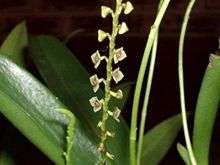Stelis
| Leach orchid | |
|---|---|
 | |
| Silvery stelis (Stelis argentata) | |
| Scientific classification | |
| Kingdom: | Plantae |
| (unranked): | Angiosperms |
| (unranked): | Monocots |
| Order: | Asparagales |
| Family: | Orchidaceae |
| Subfamily: | Epidendroideae |
| Tribe: | Epidendreae |
| Subtribe: | Pleurothallidinae |
| Genus: | Stelis Sw., 1799 |
| Synonyms[1] | |
| |
Leach orchids (genus Stelis) is a large group of orchids, with perhaps 500 species. The generic name Stelis is the Greek word for 'mistletoe', referring to the epiphytic habit of these species. These mainly epiphytic (rarely lithophytic) plants are widely distributed throughout much of South America, Central America, Mexico, the West Indies and Florida.[1]
Many of the older species were named by Lindley, Ruiz & Pavon and Reichenbach, while many of the recent species were named by Dr. C. Luer. An orchid of the genus Stelis was probably the first American orchid ever to be brought to Europe. An herbarium specimen was depicted in 1591 in Tabernaemontanus' herbal book.

first depiction of a Stelis orchid
pub 1625 in Herbal Book
of Johannes Theodorus Tabernaemontanus
Description
A single oblanceolate leaf develops from narrow, leathery outgrowths from a creeping stem.
Most species grow long, dense racemes of small to minute flower in diverse shades of white. Other colors are rare. These flowers are photosensitive, only opening in the sunlight. Some close completely at night.
The three symmetrically rounded sepals generally form a triangle with a small central structure, made up of the column, small petals and small lip, though slight variation to this theme does occur.
This genus is not common in cultivation.
Taxonomy
Cladistic research (by A. Pridgeon, R. Solano and M. Chase) has shown that the genus Stelis is monophyletic. But the distinction with several Pleurothallis subgenera is blurred (see Reference).
They are closely related to the massive genus Pleurothallis and Masdevallia. Although vegetatively the species show much variety, the flowers show a basic uniformity and are very similar throughout. Apatostelis Garay, Dialissa Lindl., Humboldtia Ruiz & Pav. and Steliopsis Brieger are generally included into Stelis.
Species
Here are some species and their common names:
- Stelis alata Lindl. : Winged Stelis.
- Stelis argentata Lindl. : Silvery Stelis
- Stelis aviceps Lindl. : Bird Head Stelis
- Stelis barbata Rolfe 1913 : Bearded Stelis.
- Stelis bidentata Schltr. 1912 : Two-toothed Stelis.
- Stelis ciliaris Lindl. 1836: Hairy Stelis
- Stelis crescentiicola Schltr. 1920: Crescentia Living Stelis.
- Stelis dalstroemii
- Stelis drosophila
- Stelis flexuosa : Flexuous Stelis.
- Stelis gemma : Gem Stelis
- Stelis glomerosa : Ball Stelis.
- Stelis guatemalensis : Guatemalan Stelis.
- Stelis intermedia : In-between Stelis.
- Stelis leinigii : Leinig's Stelis.
- Stelis megantha : Giant Anther Stelis.
- Stelis palmeiraensis : Palmeira Stelis.
- Stelis perpusilliflora : West Indian Leach Orchid
- Stelis porschiana : Porsch's Stelis.
- Stelis purpurea : Purple Stelis
- Stelis pygmaea : Pygmy Leach Orchid
- Stelis triangulisepala : Triangular Sepal Stelis.
- Stelis vinosa : Wine-like Stelis.
- Stelis wettsteiniana : Wettstein's Stelis
References
- Dr. C. Luer - Icones Pleurothallidinarum XXIV: A first century of new species of Stelis of Ecuador. Part 1 (2002); ISBN 1-930723-15-6
- Dr. C. Luer - Icones Pleurothallidinarum XXVI: Pleurothallis subgenus Acianthera and three allied subgenera; A Second Century of New Species of Stelis of Ecuador; Epibator, Ophidion, Zootrophion (2004); ISBN 1-930723-29-6
- Phylogenetic relationships in Pleurothallidinae.